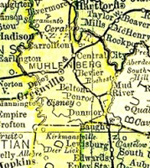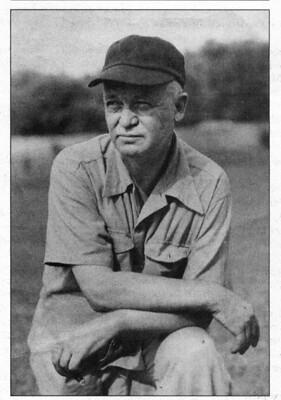Muhlenberg County Kentucky

Biographies, A
William Anderson Alexander

Famed Georgia Tech Coach Born in Tiny Mud River Area
Caption: William “Bill” Anderson Alexander was head football coach at the Georgia Institute of Technology from 1920 to 1944. He was inducted into the College Football Hall of Fame as a coach in 1951. He also served as basketball coach for Georgia Tech from 1919 to 1924. The Alexander Memorial Coliseum, the home arena of Georgia Tech's basketball teams, is named after him. Photo courtesy of Bobby Anderson.
Muhlenberg County's William Anderson Alexander became one of the most respected figures in college athletics
Only a scant handful of the present-day citzenry of Muhlenberg County, Kentucky, are aware that the now-vanished Mud River community was once a thriving coal mining town. In some eyes, it was a boom town no less.
Even fewer know that one of America's premier football coaches, William “Bill” Anderson Alexander, was born in that community.
Mud River was a remote community, lying on the river of the same name. It was located equal distance from the present site of the Gus community and the town of Rochester at the mouth of the said river. Equally remote was the county of Muhlenberg, in which the Mud River community was located. Perhaps in 1889, when Alexander was born there, football was unheard of in that area.
Muhlenberg County was better known as a coal mining area, served by a spur line of the Louisville & Nashville (L&N) Railroad, out of nearby Penrod. The town and its coal mine gained some measure of notoriety when the “blacksmith” coal found there was adjuged as “America's best coal” at the World's Fair held in St. Louis, Missouri.
Mud River Mine
The first historical mention of coal in Muhlenberg County came around 1830 when William McLean found that the “black rock” on his father's farm near Paradise would burn. He opened a small mine there and shipped coal down the river on barges.
Some ten years later, coal was discovered on Mud River at the site which would late be the community of Mud River. The coal was of an excellent variety, but the distance from a good market made the development of the area lesss then desirable.
In fact many operators made attempts to show a profit at Mud River. Even the L&N Railroad made an effort to stimulate the market, but pulled out and took up the tracks after a relatively few years. For all intents and purposes the “Mud River Exodus” began around 1900. The mining operation after that was relegated to the status of a wagon and truckk mine. Most of the residents moved away to other mining fields. The community all but died. A small mine, a ferry, a few farmers, and a one-room school were all that was left.
Over the years there were many coal operators who tried vainly to profit from their operations at Mud River. The list is too long to acknowledge. One of them however was William G.S. Anderson. He is found only once in the records of Muhlenberg County, that being in the 1900 census, when he was listed as a coal operator, residing in the small town of Mud River. Legend says he came to Mud River from Nashville to take over operations of the mine.
It was also said by old-timers, who lived in the area more than 60 years ago and new some of the miners there, that Anderson was the grandfather of Coach Bill Alexander, whose full name was William Anderson Alexander.
Coach Alexander's mother was a schoolteacher. As to which year she returned to Nashville with her son is not known; however, it is known that Mr. Alexander was living in Nashville when he applied for admission to Georgia Tech.
From Georgia Tech press releases supplied by the coach in 1950, he had not completed his high school tenure when he applied for scholastic admission to Georgia Tech. It was in 1906 when this 16-year-old boy announced when he walked into the registrar's office at Georgia Tech, “I am William Anderson Alexander from Mud River, Kentucky, and I want to study engineering.” He was admitted only as an apprentice student because of his lack of a high school background.
When Coach Alexander died in his sleep in 1950, he was still at Georgia Tech. He was not an engineer as he first requested, but instead, was one of the most respected figures in the history of college athletics.
Out of the classroom, Mr. Alexander was not skilled enough to make the varsity football team, which incidentally was coached by John Heisman, for whom the coveted Heisman Trophy was named, so, Coach Heisman designated Alexander to be captain of the scrubs and practice team.
After returning to Georgia Ttech following service in WWI, Alexander was named assistant coach under Heisman.
Coach Heisman fielded an unbeaten team at Georgia Tech in 1917, and in 1920 he elected to return to his alma mater, Pennsylvania Universaity, to coach football there. Alexander was named head football coach at Georgia Tech, a position he did not relinquish until retirement came in 1944.
Coach Alexander compiled a record of 134-95, with 15 ties while at Georgia Tech. Following is listed some of the important events in Alexander's coaching career: He graduated from Georgia Tech in 1912 with a degree in engineering. He was elevated to the position of head coach in 1920. His 1928 football team was recognized by several selectors as national champions. He was inducted into the National College Football Hall of Fame in 1951. His teams at Georgia Tech won the Southern Intercollegiate (SIAC) title three years in succession: 1920, 1921 and 1922. Mr. Alexander was also head basketball coach at Georgia Tech for four seasons, from 1919 to 1924. His football teams were the first to appear in all four major bowl games at the time. They played in the Rose Bowl in 1929, the Orange Bowl in 1940, the Cotton Bowl in 1943, and the Sugar bowl in 1944.
Author's Note: Bobby Anderson, a young want-to-be sports writer conducted his first-ever sports interview with Coach Bill Alexander in the spring of 1950, just a few weeks before the death of the legendary coach on April 23rd.
The subsequent handwritten article found life in print in the Owensboro (Daviess County) Messenger-Inquirer, where L.D. “Birdie” Gasser was sports editor. It also drew the attention of Larry Stone, publisher of the Central City (Muhlenberg County) Times-Argus. Stone immediately hired Anderson to be his sports writer/editor, a position Anderson held for 14 years before moving on to Tennessee where he became owner and editor of two weekly newspapers.
William G.S. Anderson is no relation to the writer.
Source: Anderson, Bobby. “Famed Georgia Tech coach born in tiny Mud Lick area.” Kentucky Explorer. Vol. 28, No. 1, May 2012, pp. 14-15.
Updated April 25, 2024.